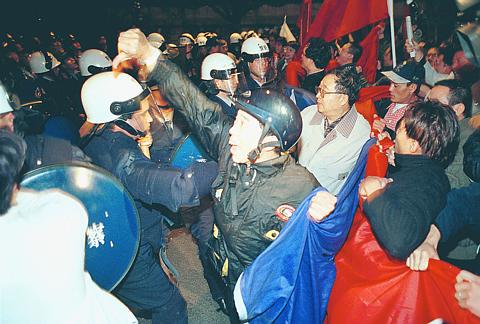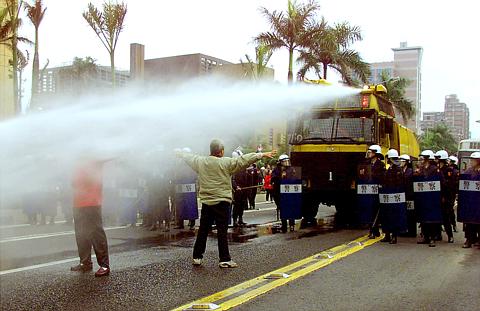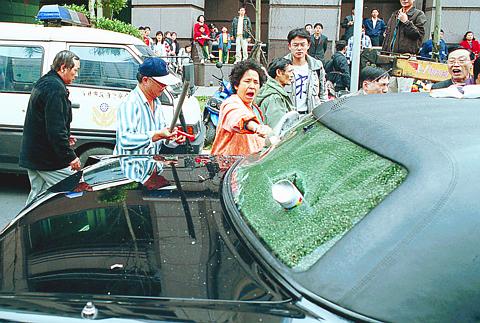Just one day after its defeat in the presidential election, the KMT found itself under siege yesterday as protesters, angry at the loss, lashed out at officials in Taipei.
KMT party chairman Lee Teng-hui (
Riot police resorted to batons and water cannon several times throughout the day in an effort to subdue and disperse the angry crowd in front of KMT headquarters demanding Lee's immediate resignation and blaming him personally for the KMT's defeat.

PHOTO: GEORGE TSORNG, TAIPEI TIMES
At press time, the streets around KMT headquarters were still occupied with thousands of demonstrators.
During a hastily called Central Standing Committee (CSC) meeting yesterday to conduct soul-searching over the party's election loss, Lee said that between now and an extraordinary session of the KMT's National Party Congress in September where the new leadership will be chosen, the party should concentrate on party reform. He advocated the immediate establishment of an ad hoc reform committee.
Outside, meanwhile, angry crowds vented their frustration by calling for Lee's immediate resignation, smashing car windows and even beating Hsu Li-teh (

PHOTO: REUTERS
"Lee step down! Lee step down!" the crowd chanted.
The protest continued into the night, with even Taipei Mayor Ma Ying-jeou (
Ma announced his resignation from his party position at the party's headquarters yesterday,along with other members of the party's leadership, including vice chairman Lien Chan (

PHOTO: GEORGE TSORNG, TAIPEI TIMES
"The chairman, secretary-general, deputy secretary-generals and department directors should all resign to take responsibility [for the failure]," Lee said.
"However, the most urgent thing for the time being is to unite our party members and to launch a complete reform," he said, calling on the party leadership to remain in place to lead the reform process.
A new leadership should be selected at September's party congress, at which time Lee would lead the collective resignation of the incumbent leadership, he said.
After the CSC meeting, KMT spokesman Huang Hwei-chen (
Asked whether Lee really intended to resign as chairman, Huang said it was obvious from Lee's remarks that he has decided to quit and would not seek renewal of his term.
Huang said that, according to the party's constitution, any change in the organization should be passed by the party's National Congress.
As to another demand of the crowd of protesters yesterday, that the party chairman post be directly elected by all party members, Huang said that according to the party's current regulations, the chairman is elected by the party's plenum, and a procedural change as major as this could only be made by the party's national congress.
Many CSC members, including Lien, were either deterred or prevented from attending yesterday's meeting by the protesters besieging the headquarters building.
One analyst said Lee's announcement was a good move both for himself and the party.
"It is better to take the initiative and set a date on leaving the post than be forced to do so," said Lin Chia-lung (
"It is a rational and convincing step," Lin said.
As to why Lee wanted to wait to step down, Lin said: "He is buying time to carry out reforms such as cleaning up party assets or restructuring the party."
Lin regarded the call for democratic reform by direct election of party chairman an issue less urgent than purging the party of gangsters and corrupt elements.
Also, he said, Lee still has an important role to play in smoothing the transition of power from the KMT to the DPP.
Who will succeed Lee is another big problem, Lin said.
"If the KMT cannot reach a consensus on its next leader, it can easily split again. And without the party assets, the KMT machine will no longer matter," he said. "Those who are not happy with the party will not find it difficult to depart."
As he announced his resignation from the CSC yesterday, Ma Ying-jeou cited a need for sweeping reforms to the party following its election defeat.
Ma said that high-ranking members are growing increasingly estranged from the rank and file.
"The KMT has 2 million members, and got about 2 million votes. Where are our members?" Ma said.
Ma encouraged other CSC members to quit so party members could elect their replacements.
He also agreed with the protesters that the party's grassroots members should directly elect the chairman.
Ma denied that his calls for reform came in response to yesterday's announcement that KMT maverick James Soong (
"No matter how many parties there are, the KMT should do everything within its power to democratize its procedures," Ma said.
Before the election, the KMT expelled dozens of its members who supported Soong's campaign, and may now lose more of its rank and file to his new party.
Meanwhile, worried about a stock market dive as a result of uncertainties created by Chen Shui-bian's election and the turmoil involving the KMT, Minister of Finance Paul Chiu (邱正雄) announced yesterday that the Taiwan Stock Exchange's daily downward limit would be halved to 3.5 percent for a two-week period.

MAKING WAVES: China’s maritime militia could become a nontraditional threat in war, clogging up shipping lanes to prevent US or Japanese intervention, a report said About 1,900 Chinese ships flying flags of convenience and fishing vessels that participated in China’s military exercises around Taiwan last month and in January have been listed for monitoring, Coast Guard Administration (CGA) Deputy Director-General Hsieh Ching-chin (謝慶欽) said yesterday. Following amendments to the Commercial Port Act (商港法) and the Law of Ships (船舶法) last month, the CGA can designate possible berthing areas or deny ports of call for vessels suspected of loitering around areas where undersea cables can be accessed, Oceans Affairs Council Minister Kuan Bi-ling (管碧玲) said. The list of suspected ships, originally 300, had risen to about 1,900 as

Japan’s strategic alliance with the US would collapse if Tokyo were to turn away from a conflict in Taiwan, Japanese Prime Minister Sanae Takaichi said yesterday, but distanced herself from previous comments that suggested a possible military response in such an event. Takaichi expressed her latest views on a nationally broadcast TV program late on Monday, where an opposition party leader criticized her for igniting tensions with China with the earlier remarks. Ties between Japan and China have sunk to the worst level in years after Takaichi said in November that a hypothetical Chinese attack on Taiwan could bring about a Japanese

Right-wing political scientist Laura Fernandez on Sunday won Costa Rica’s presidential election by a landslide, after promising to crack down on rising violence linked to the cocaine trade. Fernandez’s nearest rival, economist Alvaro Ramos, conceded defeat as results showed the ruling party far exceeding the threshold of 40 percent needed to avoid a runoff. With 94 percent of polling stations counted, the political heir of outgoing Costa Rican President Rodrigo Chaves had captured 48.3 percent of the vote compared with Ramos’ 33.4 percent, the Supreme Electoral Tribunal said. As soon as the first results were announced, members of Fernandez’s Sovereign People’s Party

MORE RESPONSIBILITY: Draftees would be expected to fight alongside professional soldiers, likely requiring the transformation of some training brigades into combat units The armed forces are to start incorporating new conscripts into combined arms brigades this year to enhance combat readiness, the Executive Yuan’s latest policy report said. The new policy would affect Taiwanese men entering the military for their compulsory service, which was extended to one year under reforms by then-president Tsai Ing-wen (蔡英文) in 2022. The conscripts would be trained to operate machine guns, uncrewed aerial vehicles, anti-tank guided missile launchers and Stinger air defense systems, the report said, adding that the basic training would be lengthened to eight weeks. After basic training, conscripts would be sorted into infantry battalions that would take